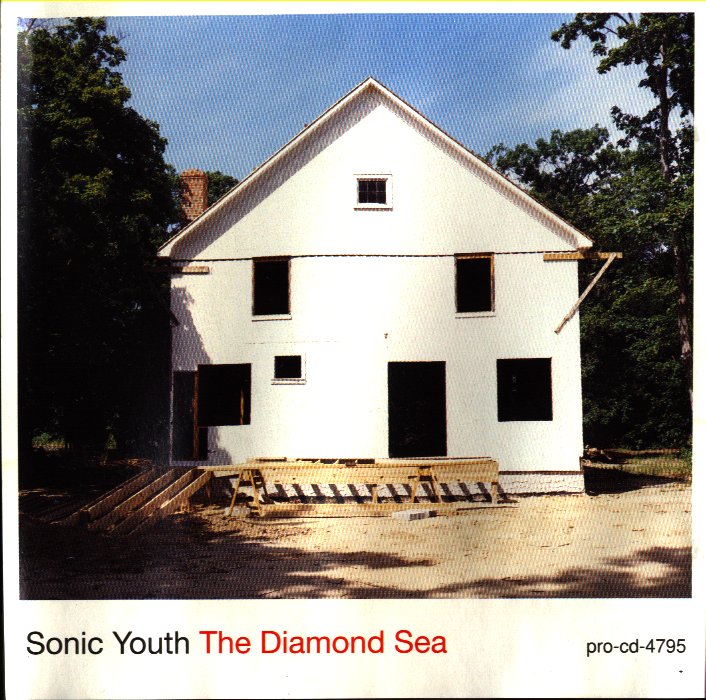In Death's Dream Kingdom
Houndstooth 2018
In its young existence, Houndstooth has developed a penchant for
putting out music that feels ominously present. 2017 alone saw the release of
acclaimed full lengths by label auteurs Throwing Snow, Special Request, and
Call Super that tap-danced across electronic styles; each took ingenuous leaps
forward with an aura of timelessness, and displayed beauty, freedom, and
identity in strange sections of the minutiae. But the challenge faced by
current musicians and record companies alike is maintaining universality, while
staying mindful of the contexts that surround an ever-changing world around
them.
Within this organization, most have come to understand that facing
reality can be an unpleasant task. The averted closure of fabric, its parent
organization and prolific nightclub, in 2016 was a painful ordeal for artists,
fans, and figures behind the scenes whose painstaking efforts made their recent
flourishes possible. Sadly, the scare was far from the only existential threat
at play in this community and others over subsequent months of global turmoil
and unrest. At a time when serious doubts and fears linger in the air with
discomforting regularity, it should come as no shock that among this creative
cohort, the UK, and beyond, the quality of “present” music and art is as
important today as it ever has been.
With In Death’s Dream Kingdom, Houndstooth has seized the
opportunity to showcase its resiliency, artistry, and audacity, grabbing it by
the lapels and shaking loose twenty-five dreadfully gripping experimental
tracks by as many artists, managing more continuity than could possibly
be expected in such an unprecedented form. The project’s title, derived from
T.S. Eliot’s evocative The Hollow Men, is a fitting inspiration for a
collective so stylistically scattered and adept at using non-linear approaches
to develop synergy with their surroundings at large. To borrow Eliot’s words,
they oblige to occupy a space “between the potency and the existence/
between the essence and the descent.” Befallen to derelict places, the poem
extends an unsteady hand toward an intriguing if not insidious prospect for the
figures involved, not only in their placement alongside other compelling
artists on a beefed-up quasi-playlist, but also in drifting toward untrodden
realms of noise and sound.
After parsing the anticipation of its announcement, the slow tease
of its day-by-day releases, and its digital-only accessibility, the first
indication of IDDK’s ambition comes from the diversity in its list of
participants. A heterogeneous mixture sees masters of ambient, atmospheric
styles featured next to peers best known for convulsive techno or
unclassifiable avante-garde, and nearly everything in between. But if it seemed
like the stark intimacy of Pan Daijing’s sinister work couldn’t share space
with Bristol-based producers Hodge and Batu’s dub and bass, or that the
Shapednoise take on Eliot’s line “shape without form” couldn’t follow the
freakish energy harnessed by Gazelle Twin, their slick confluence will come as
a surprise. Time and again, songs adhere to one another in the shadows
(Spatial/ Yves De Mey) only to juke sporadically in jarring fits and starts, a
texture that dovetails the possibility of slipping into the background and
demanding full attention. The bulk and amalgamation are oddly functional in
this way, carefully avoiding the pitfalls of turning complacent or redundant,
despite serious volume.
But there’s more to the boldness of this array than its strange
pairings or its massive appetite; the essential component is the singularity of
its aesthetic. Creating sounds without limitation is liberating in theory, but
the possibilities can be daunting without requisite points of focus or
conceptual coherence. In this case, The Hollow Men is a five-part beacon
and constant reference point. Its unsavory suggestions (“This is the dead
land”) and overarching solemnity (“Quiet and meaningless/ As wind in dried
grass”) offer a creative foothold, and impervious imagery catalyzes wicked
chain reactions. Abul Mogard’s enveloping “Trembling with Tenderness” is IDDK’s
most emotive effort, latching onto Eliot’s vulnerability and imitating it with
deft touches and shifts of force. Later, it’s Roly Porter’s turn to give a
literal interpretation in an infectious rendition of “Without Form”, complete
with garbled swells of reckoning. The indirectness of the stanzas’ thick tones
works just fine, too, as clearly evidenced by Petit Singe and Sophia Loizou’s
mechanical entrenchment around harsher ideas, much in the same way the aqueous
environments of Tomoko Sauvage and Koenraad Ecker compliment the poem’s organic
material.
It’s the display in Jazz Szu-Ying Chen’s stunningly spare cover
graphic that aptly and bleakly brings the connectedness of the literature,
visuals and sound full circle. But, naturally, calibrations were needed to take
the musician’s familiar methods and align them with the cloudy timbres called
for in their prompt, where sensibilities are stripped skeletally bare, and an
opaque blanket of fog rife with despair obfuscates the escape from an empty
existence. For percussive techno producer Peter Van Hoesen, kick drums and four
on the floor basslines are set aside in favor of bellowing drones and sweeps,
creating what could be a soundtrack for a slow-motion collision of atoms.
Others use outbursts of brooding energy to leave Burial-esque dark vibrations
in the air; Pye Corner Audio’s “Box in a Box” churns along with heady
determination, while ASC’s effort “Tesselate” uses its cosmic underbelly to
reach for something more paranoid. Regardless of which tactic is employed, each
song is its own house of cards, threatening to turn in on itself or collapse at
the smallest provocation.
To be fair, ambition and curiosity aren’t exactly unprecedented
for those behind Houndstooth’s unique vision. Rob Butterworth and Rob Booth,
who in tandem run the label, have used their FABRICLIVE and Electronic
Exploration series, respectively, for over a decade to give chances for both
young and established musicians (including many that contributed tracks to
IDDK) to spread a rarified, abnormal lens to the outer reaches of DJs and
producers. Of equal significance, they’ve cultivated the symbiosis of community
readily apparent throughout these recordings and in previous compilations,
namely in the 111-take #SAVEFABRIC, which served as a precursor to their
undeterred approach to voluminous collections, particularly in the underground.
In Death’s Dream Kingdom embarks on a mission to
acknowledge the largess of streaming-era music consumption, but subvert the
impersonality of “everything now” information seeking and instant
gratification. Instead, at the core of its existence is a combination of sonic
exploration and external awareness as a powerfully redemptive force. Amidst all
of the boundary-pushing and aural shapeshifting are tracks comfortably adrift
in the waters of abstraction, yet grounded in Eliot’s disconsolate thematics
and bleak images. The dying energy of Ian William Craig’s sprawling “An End of
Rooms” adds finality and a necessary moment of pause. Wide-eyed, shaken, and
under the dim twinkle of a fading star, we’re left grappling with a compilation
rooted in a century-old poem and in reality, one that will surely wind up being
one of the most beautifully unsettling releases of the year.





